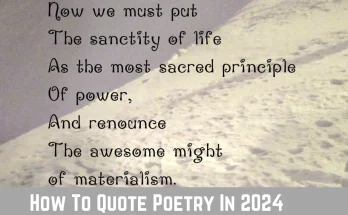“Geographic Lessons” by Zulfikar Ghose is a thought-provoking poem that explores various themes related to geography, identity, and the human condition.
Written in free verse, the poem takes readers on a journey through different landscapes, both physical and metaphorical, inviting them to reflect on their relationship with the world and the experiences that shape their existence.
Major Themes in “Geographic Lessons” by Zulfikar Ghose
Geography and Identity:
The poem explores how geographical locations influence individual identity. Different landscapes, such as the tropics, deserts, and misty regions, shape one’s perspective, values, and sense of self.
Ghose highlights the significance of place in defining who we are and how it impacts our experiences and perceptions.
Cultural Identity and Displacement:
“Geographic Lessons” delves into the theme of cultural identity and the sense of displacement experienced by individuals living in different countries.
Ghose, drawing from his personal experiences as an Indian-born poet who has lived in various nations, reflects on the complexity of cultural identity.
The poem highlights the challenges of navigating multiple identities and the longing for a place to call home.
Human Connection and Unity:
The poem celebrates the diversity of humanity and emphasizes the importance of embracing differences. As Ghose encounters various people and cultures throughout different landscapes, he underscores the idea of interconnectedness.
Despite our unique backgrounds, there are universal human emotions and desires that bind us together, transcending geographical boundaries. The theme of human connection encourages readers to appreciate shared humanity and find common ground.
Longing and Nostalgia:
“Geographic Lessons” evokes a sense of longing and nostalgia for the familiar and homeland. The poem portrays a yearning for the places left behind and captures the emotional impact of being uprooted.
Ghose’s use of vivid descriptions and imagery evokes a longing for a sense of belonging, illustrating the deep attachment to one’s roots and the desire to reclaim a lost sense of home.
Change and Transience:
The theme of transience and impermanence permeates the poem. Ghose presents landscapes as dynamic entities that continuously change and evolve.
This notion extends to the experiences of individuals as well. The poem suggests that everything in life, including places and people, is in a constant state of flux.
It invites readers to reflect on the transient nature of existence and the need to adapt to new environments.
Nature and the Human Condition:
Nature serves as a backdrop throughout the poem, reflecting the human condition and the interconnectedness between humans and the natural world. Ghose’s descriptions of diverse landscapes provide a lens through which readers can explore the human experience.
The poem presents nature as a powerful force that shapes and influences human lives, reinforcing the idea that our relationship with the environment is essential to understanding our own existence.
Conclusion: Themes in Geographic Lessons
Overall, “Geographic Lessons” by Zulfikar Ghose encompasses themes such as geography and identity, cultural identity and displacement, human connection and unity, longing and nostalgia, change and transience, and the relationship between nature and the human condition.
Through these themes, the poem invites readers to reflect on their own sense of place, cultural heritage, and the shared experiences that connect us all.



